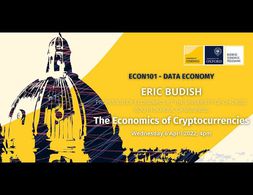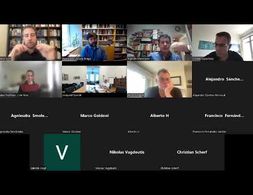1261 results
This course is intended to present some of the main ideas underlying the micro aspects of gender economics. The courses will tackle issues as fertility, marriage, women labor force participation, wage gap, gender inequality, violence against women and women empowerment within her household and within the society where she lives.
By the end of this course, students should understand the basic economic theories of the gender division of labor in the home and at the workplace, and theories of gender differences in compensation and workforce segregation.
This lecture course, which will be taught in English, will deal with gender issues in developing countries. After providing an overview of the gender differences in various aspects of welfare and economic life, the course will then tackle a number of specific issues.
To what extent does gender affect people's patterns of labor force participation, educational preparation for work, occupations, hours of work (paid and unpaid) and earnings?
Education policy seeks to ensure equality in access, equality within the classroom and in teaching- learning processes, and equality in outcomes. This course encourages students to assess and evaluate the extent to which these objectives are met in practice and the ways in which educational outcomes are shaped by, as well as alter, gendered social norms.
Getting to the policy discussion table is one of the objectives pursued by feminist scholars and advocates. However, some participants in this process have remarked that “you cannot get to the policy discussion table until you have proven that you can crunch the numbers.”
In this interview Gerd Gigerenzer place bounded rationality into the context of a larger development in thinking about what rationality is He touches on unbounded rationality which remains overrepresented and popular in neoclassical economics he explains different interpretations of bounded rationality and concludes with an ecological interpretation of rationality He …
This graduate-level course examines issues related to women’s paid and unpaid work during a time of rapid integration of world markets. Students will analyze the role of government policy, unions, corporate responsibility, and social movements in raising women's wages, promoting equal opportunity, fighting discrimination in the workplace, and improving working conditions.
In this class we will explore how globalization shapes and is shaped by gender norms with a particular focus on questions related to ‘work,’ mobility and well-being.
What are the debates, feminist and otherwise, surrounding the phenomena of globalization? How does a gendered lens complicate our understandings of neoliberal globalization? How are particular labor regimes integral to global restructuring, and how are these gendered? What are the implications of global restructuring for bodies, identities, relations, and movements?
The goal of the course is to deepen students’ understanding of the Latin American development experience by viewing it through a gender lens.
For many social critics "globalization" is a signpost of “late-capitalism” with the rise of multinational corporations, mass consumption and the multidirectional flows of capital, labor, media, communication, ideologies and social movements across national borders. Feminist analyses of globalization and the gendered and sexualized permutations of these phenomena offer a critical stance for theorizing these processes, and for studying their complex articulations across time and space.
The podcast is an interview of Silvia Federici by David Denvir. It is centred around her book 'Caliban and the Witch - Women, the Body and Primitive Accumulation', but they also draw lines to contemporary issues and political struggles. Federici analyses the emergence of capitalism through a radical Feminist-Marxist lens.
The piece describes some of the effects that Nixon's decision to delink the dollar from gold in the 1970s had for the relationship between the IMF and its member states. A focus is on the negative effects of this change on societies in the Global South.
The lecturer focuses on his own paper The Economic Limits of Bitcoin and Anonymous Decentralized Trust on the Blockchain analysing the innovation of cryptocurrencies particularly bitcoin and its economic credibility The innovator of cryptocurrency Satoshi Nakamoto incorporated an interesting combination of computer sciences and economics The paper argues the limitations …
Asset Management firms control large parts of the global economy Just the three American asset management firms BlackRock Vanguard and State Street manage more than half of the combined value of all shares for companies in the S P 500 Their combined managed assets amount to 22 trillion May 2022 …
The podcast discusses how to deal with the rising inflation and presents a comparative perspective between the US and the EMU. Basically the speakers discuss whether we are heading to a stagflation in Europe similar to the 1970s and they compare the macroeconomic dynamics in the United States vs. the EMU.
Mitch Jeserich interviews Professor Richard D Wolff a professor of economics at the New School University in New York City Prof Wolff presents an explanatory theory of how inflation occurs in an economy Briefly profit driven employers raise the price in order to maximize profits of private corporations they own …
Why did inflation lift of in 2022? Are there differences between the US and the Eurozone and if so, what are they?
To celebrate the forthcoming book A brief history of Economic Thought From the Mercantilists to the Post Keynesians edited by Louis Philippe Rochon and Hassan Bougrine Edward Elgar Louis Philippe Rochon sat down with celebrated author and scholar Sergio Rossi to discuss his contribution Milton Friedman and the Monetarist School …
Dans cette vidéo Thibault Lieurade reçoit Jézabel Couppey Soubeyran à la suite d une note publiée par l institut Veblen Cette note plaide pour un mode volontaire de création de monnaie centrale en émettant la quantité nécessaire pour mener à bien différents projets écologiques sociaux ou sanitaires Pour ce faire …
The Atlas of Economic Complexity is an award-winning data visualization tool that allows people to explore global trade flows across markets, track these dynamics over time and discover new growth opportunities for every country.
What the heck is the yield curve? And why is it considered a powerful predictor of economic crisis? Here you'll get to know.
This is the second part of the seminar A Hard Currency of Politics The discussion centers on the The Currency of Politics by Stefan Eich and is hosted by the journal European Law Open Stefan Eich s presentation of his argument starts at minute 7 53 The discussion centers on …
Is capitalism the context where gender inequalities are reproduced, or is capitalism something more than a context? What are the differences among women and how can we place them theoretically and politically. Reproductive work, is it a women’s work? These questions are disscused in a three-session workshop.
The first day of the workshop is intended to initiate students to the foundational concepts of ecological economics. Ecological economics is an ecological critique of economics, applying the energetics of life to the study of the economy. It also investigates the social distribution of environmental costs and benefits. It does so by deconstructing concepts that are taken for granted like “nature” or “the economy”, excavating their ideological origins.
In order to address discrimination, we must understand and address its fundamental basis of systemic oppression. Stratification economics goes beyond myopic mainstream conceptualisations of discrimination and recognises the historical, institutional, and structural factors that create and maintain socioeconomic disparities and hierarchies. To critically approach the economics of discrimination, this workshop will focus on stratification economics, a systematic and empirically grounded approach to addressing intergroup inequality (Darity, 2005). Focusing on racial discrimination, we will discuss the core elements of stratification economics, critically evaluate its relevance, and apply these understandings to construct case studies and solutions for change. In our discussions, we will consider an array of topics, including intersecting oppressions, reparative justice, and the role of knowledge production in overcoming injustice and creating a better world.
This syllabus opens a literary overview of must-read papers in the field of development economics.
Commons stand for a plurality of practices ‘beyond market and state’ as the famous Commons scholar – and first female noble prize winner of economics - Elinor Ostrom put it. Their practice and theory challenge classical economic theory and stand for a different mode of caring, producing and governing. Within this workshop we want to dive into theory, practice and utopia of Commons following four blocks...
Aim of this intensive workshop is 1.) to introduce the participants to the macroeconomic workings of the climate crisis as the background of sustainable finance; 2.) to introduce financial assets with ESG (Environmental, Social and Governance) criteria attached to them and their markets and important institutional players; 3.) to provide a critical perspective on the current setup of sustainable finance; 4.) and to work on in-depth case studies illustrating the workings on ESG-finance markets, its emitters and traders as well as their macroeconomic implications.
This syllabus provides an overview of the content of the Philosophy and Economics course at the University of Waterloo.
This syllabus provides an overview of the content of the Philosophy of Economics course at the University of Wisconsin-Madison.
Nous utilisons des cookies sur notre site Web. Cliquez sur Accepter pour nous aider à améliorer constamment Exploring Economics !














